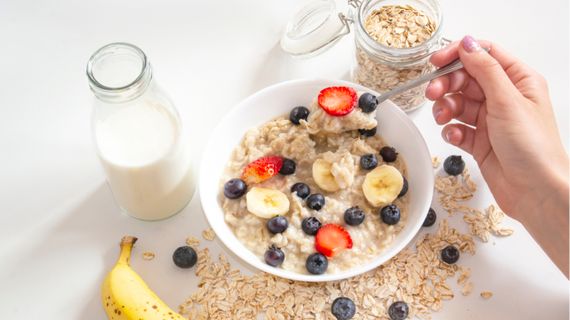Nuts are an excellent source of nutrients that easily meet the parameters of a healthy and nutritionally rich food. Virtually all basic types of nuts are sources of healthy fats, fibre and a wide range of vitamins and minerals.
When choosing nuts, many people ask which kind is actually the healthiest. Is it even possible to tell? Let's break down nuts in more detail. What makes each type stand out?
Cashews are an excellent source of magnesium and zinc
Cashews are a clear favourite of many nut lovers, mainly due to their specifically sweet taste, which is a result of their relatively high carbohydrate content. On the other hand, the fat content of cashew nuts is lower, for example, about a third less than that of pecans.
Cashew nuts are notable for their high content of magnesium (more than three‑quarters of the daily dose per 100g), zinc (about half the daily dose per 100g) and copper (daily dose already at about 60g).
Nutritional values per 100g of cashew nuts: 553 kcal, 18g protein, 33g carbohydrate, 44g fat and 3g fibre.
Natural Cashews

Walnuts surprise with their high omega‑3 fatty acid content
Walnuts are one of the richest sources of healthy fats, making them almost a superfood. However, for the same reason, they also spoil quickly, as the unsaturated fatty acids are prone to rancidity. In any case, walnuts should not taste bitter, as the bitter taste is caused by partially oxidised fatty acids, which are typically produced by improper storage.
Walnuts are also high in omega‑3 fatty acids and are one of the few domestic foods that contain the essential alpha‑linolenic acid (about 9g of omega‑3 fatty acids per 100g of nuts).
Nutritional values per 100g walnuts: 654 kcal, 15g protein, 14g carbohydrate, 65g fat and 7g fibre.
Brazil nuts are the record holder for selenium content
Brazil nuts have a high fat content and also contain a relatively high amount of saturated fatty acids compared to other nuts (about 15g per 100g of nuts, about 5 times more than almonds). They are also a rich source of antioxidants and minerals, which are indispensable for the body.
But what makes them stand out is their high selenium content - one average piece of Brazil nut contains more than the recommended daily allowance of selenium (70‑90 μg of selenium per nut, while the DACH recommended daily allowance is 70 μg per day). Selenium is found in the body in enzymes with antioxidant activity (for example, in the glutathione peroxidase family of enzymes), thus protecting the body from free radical damage.
Nutritional values per 100g of Brazil nuts: 656 kcal, 14g protein, 12g carbohydrate, 66g fat and 8g fibre.
Brazil Nuts

Almonds are packed with fibre and vitamin E
Almonds are a great source of nutrients, containing high amounts of fibre (about 12g per 100 ) and healthy fats, while the amount of saturated fatty acids is very low, practically the lowest compared to other nuts.
Almonds are also one of the richest sources of vitamin E (the recommended daily dose is about 50g), which has antioxidant effects on the body and plays an important role in the process of spermatogenesis.
Nutritional values per 100g of almonds: 575 kcal, 21g protein, 22g carbohydrates, 49g fat and 12g fibre.
Natural Almonds

Pistachios for taste and eye health
Pistachios are one of the most popular types of nuts, whose mass consumption is perhaps only hindered by their price, which is the highest compared to other types. In terms of nutrient content, pistachios are similar to almonds, which are also very low in saturated fatty acids.
Pistachios are valued for their high content of antioxidants, which are also very bioavailable to the body. Of all nuts, they have the highest levels of lutein and zeaxanthin, which are carotenoids that naturally accumulate in the retina of the eye. It is speculated that their function here is to protect the eye from free radicals, which are naturally produced by the absorption of blue radiation from daylight.
Nutritional values per 100g of pistachios: 557 kcal, 21g protein, 28g carbohydrate, 44g fat and 10g fibre.
Dry Roasted Pistachios

Hazelnuts are also packed with nutrients
Like other nuts, hazelnuts contain a wide range of vitamins and minerals, including high levels of vitamin E (daily dose is just under 100g), magnesium (about half the daily dose per 100g) and copper (daily dose is just under 100g).
Nor should we forget the high proportion of unsaturated fatty acids, which are also likely to be behind the positive effect on the cardiovascular system observed in a recently published meta‑analysis of a diet enriched with hazelnuts (29‑69g per day) . So if you include hazelnuts in your diet, and it's not through Nutella, your vascular system will definitely benefit.
Nutritional values per 100g of hazelnuts: 628 kcal, 15g protein, 17g carbohydrate, 61g fat and 10g fibre.
Dry Roasted Hazelnuts

Peanuts are not nuts but have similar properties
When peanuts are mentioned, it is not unusual for an expert to contribute to the discussion by stating that peanuts are not nuts but legumes. This is as instructive as classifying a watermelon as a vegetable—biologically correct, nutritionally less relevant.
In fact, peanuts are very close in composition to other nuts, with about half of their weight made up of fats with a high proportion of unsaturated fatty acids. They are also relatively rich in protein, containing about 26g per 100g of peanuts due to their leguminous nature and the highest protein content of any nut.
Peanuts are also a source of antioxidants, among which polyphenols, largely represented by para‑coumaric acid, stand out. A useful strategy is not to shell the peanuts, as the skin contains the highest proportion of antioxidant substances.
Nutritional values per 100g peanuts: 567 kcal, 26g protein, 16g carbohydrate, 49g fat and 9g fibre.
Dry Roasted Peanuts

Pecans are healthy too, but beware of the higher fat content
High fat is pretty much synonymous with eating nuts, but this is doubly true for pecans. They contain about 72g of fat per 100g, the most of any nut, and not far off the classic butter made from milk fat (which contains 82% fat). However, pecans still contain a large majority of healthy fats, so we don't have to worry about their moderate consumption from a health point of view.
On the contrary, one study has even shown that a diet enriched with pecans (20% of total energy intake = less than 60g of pecans per day) increased the amount of gamma‑tocopherol (one form of vitamin E) in the blood. Scientists hope this will increase the body's protection against dangerous substances, as it is an important antioxidant.
Nutritional values per 100g of pecans: 691 kcal, 9g protein, 14g carbohydrate, 72g fat and 10g fibre.
Natural Pecans

Comparison of nutritional values of different types of nuts
| Energy | Protein | Carbohydrates | Fats | Fiber | Saturated fatty acids | Mono‑unsaturated fatty acids | Omega‑3 fatty acids | Omega‑6 fatty acids | |
| Cashew nuts | 553 kcal | 18g | 30g | 44g | 3g | 8g | 24g | 0g | 8g |
| Walnuts | 654 kcal | 15g | 7g | 65g | 7g | 6g | 9g | 9g | 38g |
| Steam nuts | 656 kcal | 14g | 4g | 66g | 8g | 15g | 25g | 0g | 21g |
| Almonds | 575 kcal | 21g | 10g | 49g | 12g | 4g | 31g | 0g | 12g |
| Pistachios | 557 kcal | 21g | 18g | 44g | 10g | 5g | 23g | 0g | 13 g |
| Hazelnuts | 628 kcal | 15g | 7g | 61g | 10g | 5g | 46g | 0g | 8g |
| Peanuts | 567 kcal | 26g | 7g | 49g | 9g | 7g | 24g | 0g | 16g |
| Pecans | 691 kcal | 9g | 4g | 72g | 10g | 6g | 41g | 1g | 21g |
Comparison of vitamin, mineral and trace element content
| Vitamin A | Vitamin E | Magnesium | Zinc | Copper | Calcium | Selenium | |
| Recommended daily allowance according to DACH | 1mg men, 0.8 women | 14mg men, 12mg women | 350mg men, 300mg women | 11‑16mg men, 7‑10mg women | 1‑1.5mg | 1000mg | 70 μg men, 60 μg women |
| Cashew nuts | 0 IU | 0.9mg | 292mg | 5.8mg | 22mg | 37mg | 19,9 μg |
| Walnuts | 20 IU | 0.7mg | 158mg | 3.1mg | 1.6mg | 98mg | 49 μg |
| Para nuts | 0 IU | 5.7mg | 376mg | 4.1mg | 1.7mg | 160mg | 1917 μg |
| Almonds | 1 IU | 26.2mg | 268mg | 3.1mg | 1mg | 264mg | 2.5 μg |
| Pistachios | 553 IU | 2.3mg | 121mg | 2.2mg | 1.3mg | 107mg | 7 μg |
| Hazelnuts | 20 IU | 15mg | 163mg | 2.5mg | 1.7mg | 114mg | 2.4 μg |
| Peanuts | 0 IU | 83mg | 168mg | 3.3mg | 1.1mg | 92mg | 7.2 μg |
| Pecans | 56 IU | 14mg | 121mg | 4.5mg | 1.2mg | 70mg | 3.8 μg |
Bottom line
Whichever type of nuts you choose, if stored properly, you won't go wrong nutritionally. All varieties are rich sources of nutrients, containing healthy fats, a high proportion of fibre and a wide variety of virtually all vitamins and minerals.
Of course, even nuts are not flawless, and in some situations, eating them can cause problems. Bitter or astringent nuts are usually a sign of poor storage, during which the oils present are oxidised and should not be consumed. Similarly, nuts stored in a damp environment can develop mould, with aflatoxins being the most common. In such cases, their consumption is harmful to health.
Therefore, choose high‑quality nuts that have been stored properly from proven suppliers. You can also use domestic produce to ensure they have not travelled long distances.
For regular consumption, hazelnuts, walnuts and almonds are the most beneficial in terms of macronutrients, as they are high in fibre, unsaturated fatty acids, and, in the case of walnuts, omega‑3 fatty acids. However, other types of nuts also offer great nutritional benefits and can complement the above‑mentioned nuts perfectly.

















